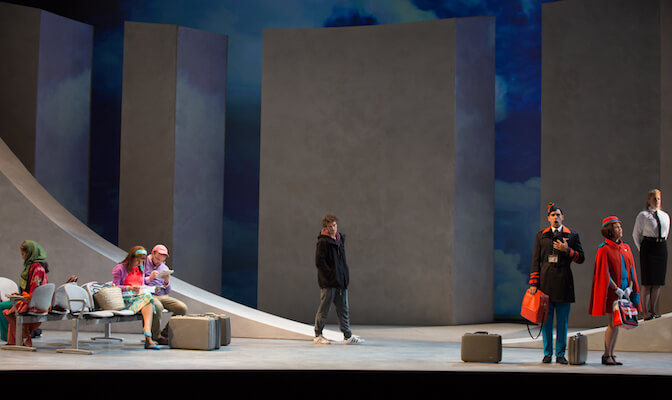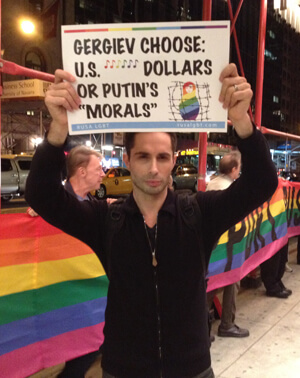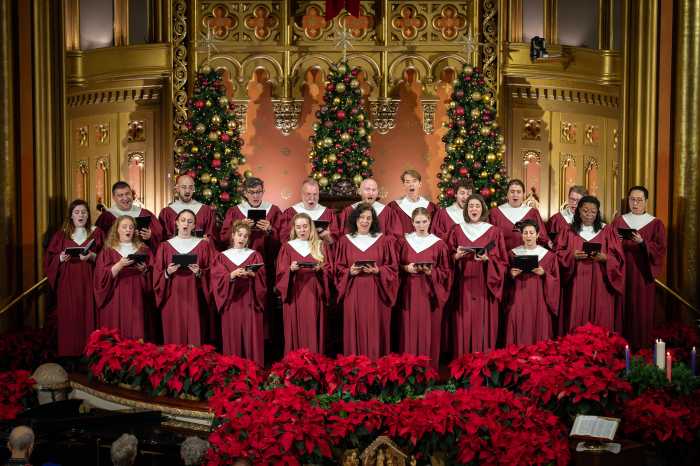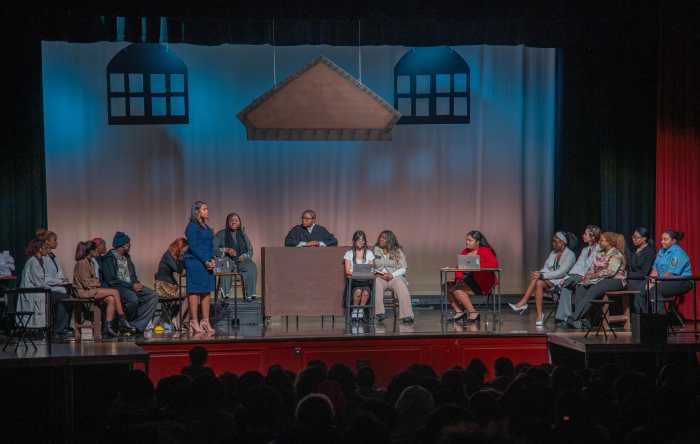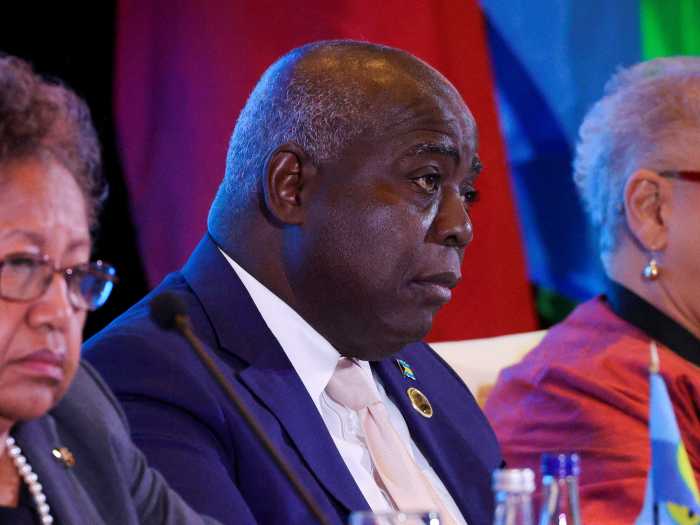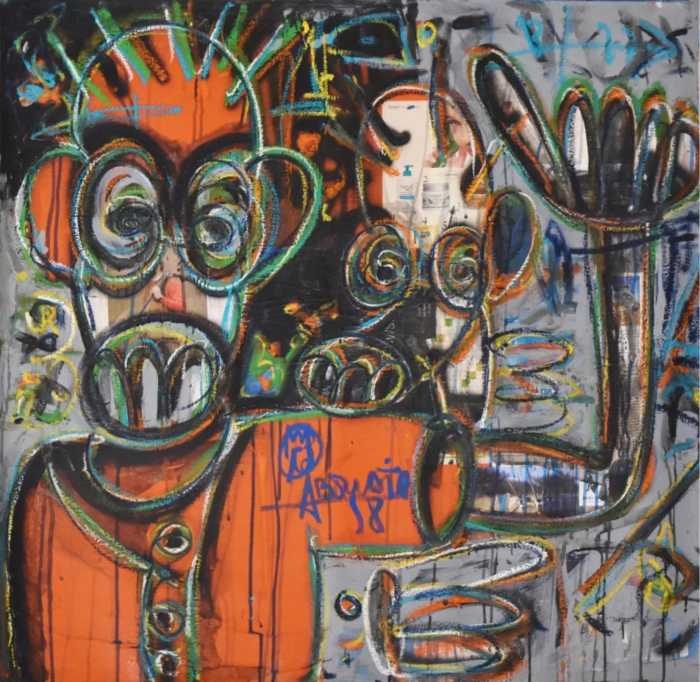Anna Netrebko in the Metropolitan Opera production of Puccini’s “Manon Lescaut.” | KEN HOWARD/ METROPOLITAN OPERA
The Met revived last year’s direly misconceived production of “Manon Lescaut” and improved on it in some ways — though, heard November 30, Marco Armiliato’s adequate, routine traversal didn’t match Fabio Luisi’s way with the score. Paula Williams dispensed with some of the meandering absurdities of Richard Eyre’s Act One “Nazi brunch alfredo,” but we still got the exiled prostitutes dressed as if they had just been hauled in from performing “Gotta Have a Gimmick” at Minsky’s. Where Act Four is meant to transpire is anybody’s guess.
Anna Netrebko has an apt, gorgeous spinto timbre for the title role. For two acts she was pitchy and approximate technically, making some lovely notes on occasion but often disconnected both to pitch and to text; she seemed to be playing Real Parisian Housewife Musetta, or a less charming version of her own shop-to-drop self. She made little contact with Marcelo Álvarez’s earnest, hardworking, semaphoric-handed but sincere Des Grieux, who sounded reasonably good when not flatting or glottal-gasping through climactic high notes and shaded his dynamics throughout. Russians and diva worshippers shouted approval of everything Netrebko did. I found it disappointing.
After the second (interminable) intermission, we had a completely different level of performance, with the leading lady in a simple prison dress that seemed, welcomely, to take the Kardashian flounce out of her acting. Both leads offered committed, usually successful, and more focused vocalism that made –– in Puccini’s intense Act Four, especially — their interplay moving and exciting. Suddenly, we were at a striking performance of a great opera.
Puccini, Dove, Verdi offerings at Lincoln Center
Christopher Maltman has always struck me as an unnecessary import fueled by British hype, but he gave a fully worked-through performance as Lescaut –– last year a complete cipher courtesy of Massimo Cavalletti –– in more resonant tones than I’d heard him produce before. Brindley Sherratt repeated his strongly sung and characterized Geronte, Zach Borichevsky his vocally lackluster Edmondo. The most distinguished among the minor role singers were Avery Amereau (Musico) and Richard Bernstein (Captain).
Jakub Józef OrliÅ„ski (center) in the Juilliard Opera Theater production of Jonathan Dove’s “Flight.” | ROSALIE O’CONNOR
Juilliard Opera Theater scored yet another success presenting Jonathan Dove’s diverting (and timely, if not perhaps deathless) “Flight” on November 16. The 1998 opera riffs on a real case of a refugee stuck stateless by circumstances in an airport, showing his interaction with a group of people going — or trying to go — on “normal” trips, for work, variety, or in hope of romance. Keenly directed by James Darrah, and housed in excellent designs by Ellen Lenbergs –– augmented by video effects of sky and storm by Adam Larsen — the comedy of manners played out well. The piece has a somewhat perky British sensibility, incorporating an impromptu gay affair between a randy steward and a thitherto dull-seeming nerdy husband that –– with what seemed to me almost unexamined misogyny — coincided in time with a “Bacchae”-like attack on the Refugee by four of the women.
The score, very skillfully orchestrated, is eclectic to the point of “Thieving Magpie” status; bits culled from “Falstaff” and “ Jenůfa” rub shoulders with gestures reminiscent of “Company.” Steven Osgood prepared the excellent Juilliard Orchestra well, and dealt with Dove’s wide-ranging stylistic and dynamic demands capably. As usual at Juilliard, every singer displayed some promise and accomplishment. The school’s model-handsome countertenor “It” boy Jakub Józef OrliÅ„ski moved wonderfully as the Refugee. His singing is luminous and appealing most of the time: when forcing he flats slightly and the word are not ideally comprehensible.
Soprano Rebecca Farley offered spectacular high-register singing and admirable dramatic acumen as the Walkuere-like Controller. It’s a shame the sound design masked her extraordinary vocalism in extra resonance. Skirting caricature, Amanda Lynn Bottoms fielded a pleasing, individual mezzo timbre and proved moving as an Older Woman waiting in vain for a boy toy lover. One enjoyed clean negotiation of “veddy” British high tenor writing by Matthew Swensen’s orientation-pliable Bill and elegant lyric baritone singing from Xiaomeng Zhang, as a diplomat bound for Minsk. As with OrliÅ„ski, his tonal focus was sometimes challenged at high fortes. I’m glad finally to have seen this opera — and so well performed.
Some vocal works haunt New York season after season, without respite. To me, Brahms’ “Requiem” and Mahler’s “Resurrection” Symphony — whatever their merits –– fall into this category. However, Giuseppe Verdi’s splendid “Requiem” is always welcome: a thrilling piece at the border of sacred music and operatic theatricality.
Lincoln Center Great Performances hosted the piece at Geffen on October 30, with the visiting London Symphony Orchestra and Chorus. The LSO played it here under Colin Davis in 2005 — a reading particularly distinguished by soprano Anne Schwanewilms. Here Gianandrea Noseda –– one of the LSO’s two principal guest conductors –– took the helm, and quite thrillingly. He exerted tight control over phrasing and dynamics — a good thing when a cell phone interrupted the “Libera me” and he held off the choral entry. Plus, the reading had propulsion and exciting feeling.
Pretty, slim Erika Grimaldi, a dark –– almost bitter-toned — lyric soprano, is a frequent Noseda soloist; other than a nice float at the top and a certain idiomatic intensity, it was hard to hear why. Perhaps in late verismo roles her approach would work; Verdi needs some “morbidezza,” or softness. Grimaldi’s metallic, unyouthful sound got lost under the chorus.
Daniela Barcellona’s mezzo, musically deployed, emerged attractive yet somewhat afflicted with vibrato. Francesco Meli being ill, rising tenor Giorgio Berrugi stepped in very impressively, with shining tone and clear projection. He didn’t really execute trills, but few tenors do in this music, heard live. He’s someone to watch. Bass Vitalij Kowaljow intoned his music with solid gravity. Simon Halsey’s chorus astonished with its dynamic precision.
David Shengold (shengold@yahoo.com) writes about opera for many venues.

